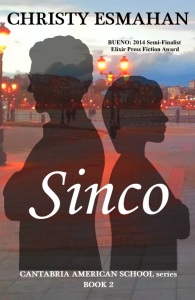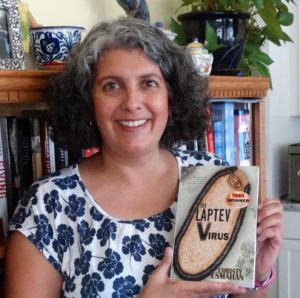 In Jewish tradition, this month before the High Holy Days is called Elul. It is a time of reflection, a time to think about the past year, ponder manners in which one may have “missed the mark” and which one now regrets. Harvey Jones, the main character in my debut series, the Cantabria American School novels, is a Jewish man, although he considers himself an ethnic Jew, i.e. not one to go to services regularly or follow all of the rules.
In Jewish tradition, this month before the High Holy Days is called Elul. It is a time of reflection, a time to think about the past year, ponder manners in which one may have “missed the mark” and which one now regrets. Harvey Jones, the main character in my debut series, the Cantabria American School novels, is a Jewish man, although he considers himself an ethnic Jew, i.e. not one to go to services regularly or follow all of the rules.
He is a complex, flawed and endearing character, one who is dealing with grief (his beloved brother Sammy was killed accidentally by the terrorist group, ETA) and with the anger and disapproval that his father laid heavily upon him as a child.
He is also struggling to manage the group of disgruntled employees, difficult teachers, at his present school in northern Spain, where he is a foreigner.
In the second book of the trilogy, Sinco, Harvey has made a bad mistake—he neglected (procrastinated to his detriment) telling his girlfriend, Carmen, about an important event from his past and she (quite understandably) feels betrayed when she finds out from others.
Under these trying circumstances, when Harvey is feeling anguished by the thought of possibly losing her, the love of his life, his Judaic teachings surface and his apology is rendered more solid as a result.
Here is an excerpt from the scene, after he had spent quite a bit of time telling her the entire story:
“Carmen, it was so wrong of me not to tell you sooner,” he whispered.
She nodded.
“And I can see how, if you only heard part of the story, you must have thought me a monster…”
She nodded again.
“Do you…do you think you could ever forgive me?”
Carmen looked up at him, but kept her arms folded. “Bueno, Harvey, I am not sure…relationships take trust, and you have not shown me that you trust me.”
Harvey held her eyes. “It was really wrong of me not to trust you. I was frightened that I wouldn’t be able to explain it…but I really did mean to tell you, eventually. I thought about doing it several times but there never seemed to be a good time to talk about something so awful…but that’s not an excuse. Look, in Judaism, when someone makes a mistake, a really bad one like this one, they teach that you can only be truly forgiven once you are faced with a similar set of circumstances and then make a different and better decision the next time around.”
Carmen looked at him doubtfully.
“So, say for example,” said Harvey, rushing to make his point, “I walk by a fruit stand and there’s this beautiful apple and I’m hungry and I don’t happen to have any money on me and the shop keeper isn’t watching so I steal the apple. Saying ‘I’m sorry’ doesn’t cut it. I can, and should, pay the shop owner for the apple that I stole, and that helps, but even then, I’m not truly forgiven. But if the next time and the time after that and so on, when I walk by the stand and I’m hungry and I don’t have money and he’s not watching, I still don’t steal the apple, then I’m forgiven.”
Carmen nodded and continued looking at him.
“What I stole, Carmen, was far more valuable than an apple,” said Harvey, his voice quavering. “I…I stole your trust in me, and it was a particularly bad thing to steal when your heart had already been broken by the circumstances of losing Javier. But please, Carmen, I’m begging you with all my heart, please give me another chance. I promise that I will never be this stupid about not telling you things that you should know in advance. Oh, Carmen, I love you so much, and these last several days, thinking I…that I had lost you, they’ve been the worst days of my life. It’s been absolute hell. My dearest, sweet Carmen. Please say you’ll give me another chance.”
I’ve not added any more of the scene as I don’t want to spoil the book. What do you think? Have you ever hurt anyone by omission? Are there people to whom you’d like to apologize and don’t know how or when to do so?
If you enjoyed this blog post you might also like my series of novels, Bueno, Sinco and Brujas, which takes place in Santander, Spain.


